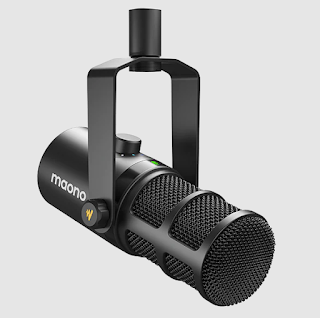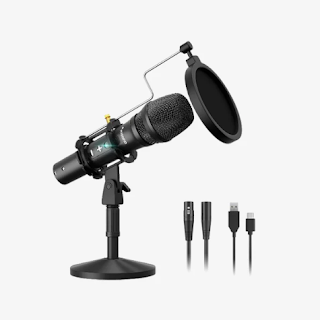Unleash Your Voice: Choosing the Perfect Podcast Mic
In the dynamic world of podcasting, the importance of high-quality audio cannot be overstated. The right podcast microphone is a key element in delivering clear, professional-sounding content that captivates your audience. This guide explores the essential features, considerations, and top picks for finding the perfect podcast mic to elevate your podcasting experience.
Understanding
the Importance of a Quality Podcast Mic:
Clarity
and Professionalism:
Overview: A quality
podcast
mic ensures clear, professional-grade audio. Listeners appreciate a
well-captured voice that enhances the overall quality of your podcast,
fostering engagement and loyalty.
Reduced
Background Noise:
Focus: Premium
podcast mics are designed to minimize background noise and focus on capturing
your voice. This is crucial for maintaining a polished and distraction-free
listening experience for your audience.
Versatility
Across Environments:
Tactic: The right
podcast microphone adapts to various recording environments. Whether you're
recording in a studio, at home, or on the go, a versatile mic provides
consistent and reliable performance in different settings.
Compatibility
with Recording Devices:
Tactic: Consider
a podcast mic that is compatible with a range of recording devices, from
computers to audio interfaces. This flexibility ensures seamless integration
with your existing podcasting setup.
Key Features to Look for in a Podcast
Mic:
Condenser
vs. Dynamic Microphones:
Feature: Condenser
microphones are known for capturing a wide range of frequencies and delivering
a more detailed sound, making them ideal for studio setups. Dynamic
microphones, on the other hand, are rugged and effective at isolating your
voice from background noise, making them suitable for various environments.
Cardioid
or Directional Pickup Pattern:
Feature: A
cardioid or directional pickup pattern focuses on capturing sound from a
specific direction, reducing unwanted noise from the sides and rear. This
pattern is ideal for solo podcasters or those recording in noisy environments.
USB
vs. XLR Connectivity:
Feature: USB
microphones offer plug-and-play convenience, making them user-friendly for
beginners. XLR microphones, on the other hand, provide more flexibility and are
often preferred by professional podcasters who use audio interfaces for
advanced control.
Frequency
Response:
Feature: The
frequency response of a podcast mic determines the range of frequencies it can
capture. Look for a microphone with a broad and flat frequency response to
ensure a natural and balanced sound reproduction.
Headphone
Jack for Monitoring:
Feature: A
built-in headphone jack allows for real-time monitoring of your audio while
recording. This feature ensures that you can identify and address any issues,
such as background noise or distortion, during the recording process.
Top
Picks for Podcast Mics:
Blue
Yeti USB Microphone:
Highlight: The Blue
Yeti is a popular choice for beginners due to its ease of use and USB
connectivity. It offers multiple pickup patterns, including cardioid, making it
versatile for different recording scenarios.
Shure
SM7B Cardioid Dynamic Microphone:
Highlight: The Shure
SM7B is a professional-grade dynamic microphone known for its smooth, flat,
wide-range frequency response. It excels in isolating the speaker's voice and
reducing background noise.
Audio-Technica
ATR2100x-USB Cardioid Dynamic Microphone:
Highlight: This
versatile microphone offers both USB and XLR connectivity, making it suitable
for a range of recording setups. It features a cardioid pickup pattern and is
known for its durability.
Rode
NT-USB Mini USB Microphone:
Highlight: The Rode
NT-USB Mini is a compact USB microphone with a cardioid pickup pattern. It
delivers studio-quality recording and is designed for simplicity, making it an
excellent choice for podcasters on the go.
Considerations
When Choosing a Podcast Mic:
Budget
Constraints:
Consideration: Determine
your budget for a podcast microphone. There are quality options available at
various price points, so finding one that suits your needs and budget is
achievable.
Recording
Environment:
Consideration: Assess
your typical recording environment. If you record in a controlled studio
setting, a sensitive condenser microphone may be ideal. For on-the-go
podcasters, a durable dynamic microphone may better suit varied environments.
Future-Proofing
Your Setup:
Consideration: Consider
your long-term podcasting goals. If you plan to upgrade your recording setup in
the future, investing in a microphone with XLR connectivity provides greater
flexibility and compatibility with advanced audio interfaces.
Interviews
and Multiple Speakers:
Consideration: If your
podcast involves interviews or multiple speakers, a microphone with an
omnidirectional pickup pattern or the ability to capture sound from various
directions may be beneficial.
Conclusion:
Selecting the right podcast microphone
is a pivotal decision that directly impacts the quality of your content.
Whether you're a seasoned podcaster or just starting your journey,
understanding the features, considering your specific needs, and exploring top
picks in the market will guide you towards a microphone that unlocks the full
potential of your voice and elevates your podcast to new heights.
For
more info. Visit us:



Comments
Post a Comment